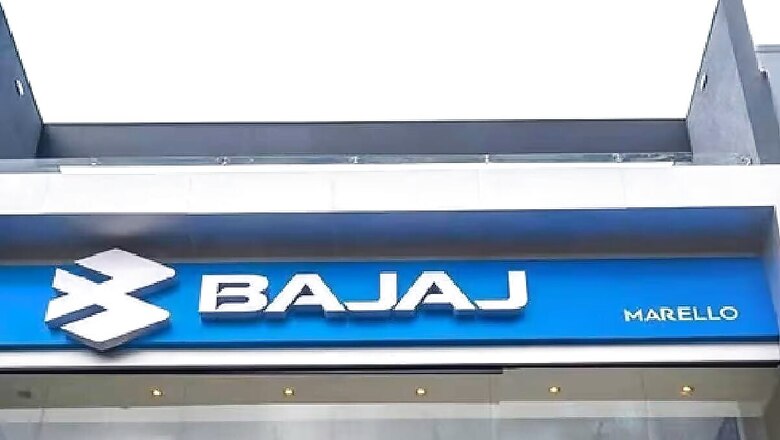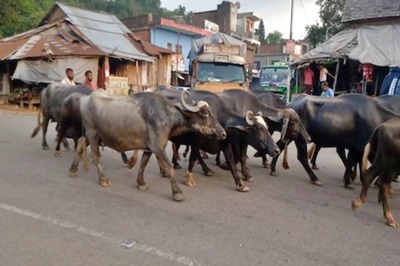
views
Bajaj Auto Share Price Today: Shares of Bajaj Auto continued their downward slide and tumbled more than 10 per cent to Rs 10,414 in morning trade on October 17 after the company posted lower-than-expected net profit in the second quarter. This comes after it revised its growth outlook for two-wheeler sales in India to a modest 5 percent, at the lower end of its earlier estimate of 5-8 per cent.
For the quarter, the Pune-headquartered company reported a 9 per cent increase in standalone net profit to Rs 2,005 crore for the second quarter of FY2024-25, falling short of analysts’ estimates. Profit After Tax (PAT) grew from Rs 1,836 crore in the same quarter last year. Revenue for the July-September period rose 22 per cent to Rs 13,127 crore, compared to Rs 10,777 crore in the previous year.
According to Chirag Jain, Senior Research Analyst at Emkay Global Financial Services, Bajaj Auto’s Q2 results were marginally weak due to a lower Average Selling Price (ASP).
“The company’s two-wheeler retail growth has been muted, with market share loss in the fast-growing 125cc category; management expects FY25 industry growth to be closer to 5 per cent than 8 per cent if the ongoing below-par festive performance persists,” Jain said.
The brokerage firm downgraded Bajaj Auto to ‘Sell’ from ‘Reduce’, and revised the target price to Rs 9,500 per share, implying a downside of over 18 per cent from Wednesday’s closing price.
Emkay Global said it prefers Hero MotoCorp, with its better risk-reward and TVS Motor Company on improved growth prospects in the two-wheeler segment.
Foreign brokerage firm Citi has a ‘Sell’ rating on Bajaj Auto and a target price of Rs 7,800 per share, signalling a downside of more than 32 per cent. It believes Bajaj Auto’s Q2 results were marginally below estimates due to a slight miss in ASPs and gross margin.
Macquarie maintains a neutral stance on Bajaj Auto with a target price of Rs 11,200 per share. While Q2 was an in-line quarter, gross margins were disappointing due to a higher share of new products. Macquarie noted a muted festive outlook compared to its expectations.
However, HSBC, Jefferies and Morgan Stanley have all issued bullish calls citing positive levers for growth ahead.
With a target price of Rs 14,000 per share, HSBC says Bajaj Auto is catching up with a 30 per cent market share, and EV penetration has increased to 20 percent in the three-wheeler segment. This penetration is driven by a lower total cost of ownership (TCO) and favourable regulations and subsidies. HSBC also believes the next disruption will likely come from the formalization of the e-rickshaw space, with Bajaj’s potential launch being a key driver.
Jefferies, also having a ‘buy’ recommendation on the counter, suggests that management remains optimistic about continued quarter-on-quarter improvements in exports. The brokerage projects a 14 per cent volume CAGR over FY24-27, driven by rising Indian two-wheeler demand and a cyclical recovery in exports. The company is also gaining market share in e-2Ws, ramping up CNG bike volumes, and expanding capacity in Brazil, it added.
Morgan Stanley also remains ‘overweight’ and suggests that Bajaj’s aim to maintain margins at current levels is a positive. However, the rise of electric vehicles (EVs) could offset product mix gains. HSBC’s target price is Rs 11,389 which the company has already surpassed.
Hero MotoCorp, Maruti: Why auto stocks are falling today
Shares of major auto companies, including Bajaj Auto, Hero MotoCorp, and Eicher Motors, tumbled in early trade on Thursday, following Bajaj Auto’s release of its Q2FY25 financial results. The two-wheeler giant’s weaker-than-expected sales outlook for the crucial festive season has rattled the market, dragging down the broader auto sector.
The cautious outlook not only affected Bajaj Auto’s stock but also weighed on shares of its competitors. Hero MotoCorp saw its shares fall 3.61 per cent to Rs 5,202.40, while Eicher Motors, the maker of Royal Enfield motorcycles, was down 1.52 per cent at Rs 4,606.75.
Carmakers weren’t spared either, with shares of Maruti Suzuki India dropping 2.01 per cent to Rs 12,125, and Mahindra & Mahindra (M&M) declining 2.49 per cent to Rs 2,989.15. The ripple effect across the auto sector reflects broader concerns about a potential slowdown in consumer demand during the festive season, typically a time of strong sales for automakers.
Rising inflation, particularly food prices, has caused many consumers to tighten their budgets, leading to weaker-than-expected demand for big-ticket purchases like motorcycles and cars. The shift in consumer behaviour ahead of the festive season could contribute to the auto sector’s underperformance in the market.
Despite Bajaj Auto reporting solid profit growth and meeting margin expectations, analysts noted that the stock had been trading at high valuations, with limited room for upside. The company’s cautious festive season outlook has added to the market’s concern, prompting a sell-off in both two-wheeler and four-wheeler stocks.


















Comments
0 comment